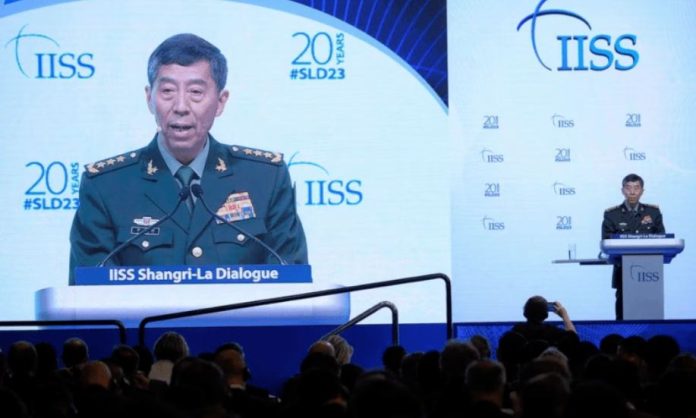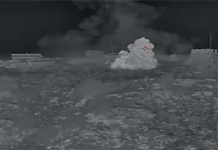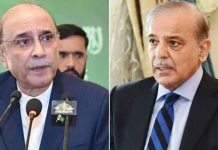Chinese Defence Minister Li Shangfu told Asia’s top security summit on Sunday that conflict with the United States would be an “unbearable disaster” but that his country sought dialogue over confrontation.
Speaking at the Shangri-La Dialogue in Singapore, Li said the world was big enough for China and the US to grow together — remarks made days after he refused to meet his US counterpart for direct talks.
“China and the US have different systems and are different in many other ways,” he said in a speech that marked his first significant international address since he was named China’s Minister of National Defence in March.
“However, this should not keep the two sides from seeking common ground and common interests to grow bilateral ties and deepen cooperation,” he said.
“It is undeniable that a severe conflict or confrontation between China and the US will be an unbearable disaster for the world.”
Wearing the general’s uniform of the People’s Liberation Army, Li made his address on the 34th anniversary of the 1989 Tiananmen Square crackdown.
Ties between Washington and Beijing are badly strained over a range of issues, including democratically governed Taiwan, territorial disputes in the South China Sea and President Joe Biden’s restrictions on semiconductor chip exports.
As delegates at the summit debated the risks of accidents and miscalculations amid those tensions, the US Navy said a Chinese destroyer made “unsafe” manoeuvres near a US warship in the Taiwan Straits on Saturday, highlighting the dangers.
China’s military criticised the United States and Canada for “deliberately provoking risk” after their warships staged a rare joint sailing through the sensitive strait.
US Indo-Pacific Command said US and Canadian ships were operating routinely and under high-seas freedoms.
Canadian defence minister Anita Anand said that Canada would continue to sail where international law allows, including the Strait, and that “actors in this region must engage responsibly”.
In his speech, Li said China would not allow such freedom-of-navigation patrols by the United States and its allies to be “a pretext to exercise hegemony of navigation”.
After his remarks, regional scholars asked Li repeatedly about the incident as well as China’s extensive maritime deployments in the disputed South China Sea. He did not answer them directly, saying moves by countries outside the region were raising tensions.
Richard Marles, Australian deputy prime minister and defence minister, said his country’s efforts to improve its military capabilities and presence in the region were aimed at “playing our part in contributing to the collective security of the Pacific and the maintenance of the rules-based order”.
“It is a point I made that we have repeatedly made to the region and to the world since we announced the optimal pathway to acquiring nuclear-powered submarine capability,” he said on the sidelines of the security meeting, referring to the AUKUS pact with the United States and Britain.
US Secretary of Defence Lloyd Austin rebuked China in a speech at the summit on Saturday for refusing to hold military talks, leaving the superpowers deadlocked over their differences.
Austin said dialogue “is not a reward, but a necessity”.
Li was more restrained in his address, although he took thinly veiled digs at the United States, accusing “some countries” of intensifying an arms race and wilfully interfering in the internal affairs of others.
“A Cold War mentality is now resurgent, greatly increasing security risks,” he said. “Mutual respect should prevail over bullying and hegemony.”
Li — sanctioned by the United States in 2018 over weapons purchases from Russia — shook hands with Austin at a dinner on Friday but the two have not had a deeper discussion, despite repeated US demands for more military exchanges.
Alongside the speeches and panel discussions, senior intelligence officials from both sides attended a secret meeting of spy chiefs in Singapore on the fringes of the summit, Reuters reported on Sunday.
After Li’s speech, retired veteran Chinese diplomat Cui Tiankai urged the United States to ease military deployments close to China in an act of “good faith” if high-level defence talks between the two superpowers are to resume.
Chong Ja Ian, a political scientist at the National University of Singapore, said that Li’s approach and tone appeared gentler than that of Chinese positions stated at previous summits but that “the content was the same”.
“It was a reflection of the distance between the U.S. and the PRC, which also suggests that any hope that there will be some resolution is naive. US, PRC competition is here to stay,” he said.

















